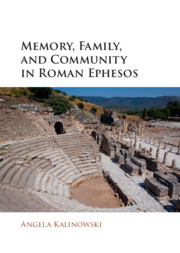Book contents
- Memory, Family, and Community in Roman Ephesos
- Memory, Family, and Community in Roman Ephesos
- Copyright page
- Dedication
- Contents
- Figures
- Maps
- Tables
- Acknowledgments
- Abbreviations
- Introduction: Memory, Family, and Community in Roman Ephesos
- 1 Community, Identity, and Memory in Roman Ephesos
- 2 The Vedii: A Family’s History in Ephesos
- 3 “Great is Artemis of the Ephesians!” The Vedii and the Goddess of Ephesos
- 4 Fun and Games in Roman Ephesos: The Vedii, the Agonistic Festivals, and the Imperial Cult
- 5 The Vedii and the Associations of Ephesos
- 6 The Vedii and Their Civic Buildings in Ephesos
- Conclusions The Vedii: A Family’s Place in the Community and in the Commemorative Landscape of Ephesos
- Appendix Who’s Who among the Ephesian Vedii and Flavii Vedii
- Bibliography
- Subject Index
- Index of Inscriptions
Conclusions The Vedii: A Family’s Place in the Community and in the Commemorative Landscape of Ephesos
Published online by Cambridge University Press: 06 July 2021
- Memory, Family, and Community in Roman Ephesos
- Memory, Family, and Community in Roman Ephesos
- Copyright page
- Dedication
- Contents
- Figures
- Maps
- Tables
- Acknowledgments
- Abbreviations
- Introduction: Memory, Family, and Community in Roman Ephesos
- 1 Community, Identity, and Memory in Roman Ephesos
- 2 The Vedii: A Family’s History in Ephesos
- 3 “Great is Artemis of the Ephesians!” The Vedii and the Goddess of Ephesos
- 4 Fun and Games in Roman Ephesos: The Vedii, the Agonistic Festivals, and the Imperial Cult
- 5 The Vedii and the Associations of Ephesos
- 6 The Vedii and Their Civic Buildings in Ephesos
- Conclusions The Vedii: A Family’s Place in the Community and in the Commemorative Landscape of Ephesos
- Appendix Who’s Who among the Ephesian Vedii and Flavii Vedii
- Bibliography
- Subject Index
- Index of Inscriptions
Summary
This book started with the idea that the ancient urban environment was a landscape of memory (milieu de mémoire) where individual, family, and collective identities were constructed and evoked in the epigraphic and built environment. It has taken as a case study the best-known Ephesian family, the Vedii and their descendants the Flavii Vedii, who are commemorated in different kinds of inscriptions, and in buildings from the late first to mid-third century. They are a rare case in the provinces where we have good evidence for the activities of seven generations of an elite family. Their impact on the physical environment of Ephesos and their enduring legacy is remarkable. If we look beyond the words inscribed in stone, or the persons figured in static statues, or the gleaming marble of their structures, we see that the men and women of the family were active and visible members of their community and that they affected their city’s daily life. They walked its streets; they organized its festivals; they attended the meetings of its civic bodies; and they were recognized and acclaimed by its citizens. Inscriptions and buildings only vaguely hint at the relationships between members of the Ephesian community. However, it is through the close study of the inscriptions and the buildings that we ever so slightly lift the curtain, and glimpse the internal relations of a Romanized Greek city in the Eastern Empire.
- Type
- Chapter
- Information
- Memory, Family, and Community in Roman Ephesos , pp. 367 - 374Publisher: Cambridge University PressPrint publication year: 2021

